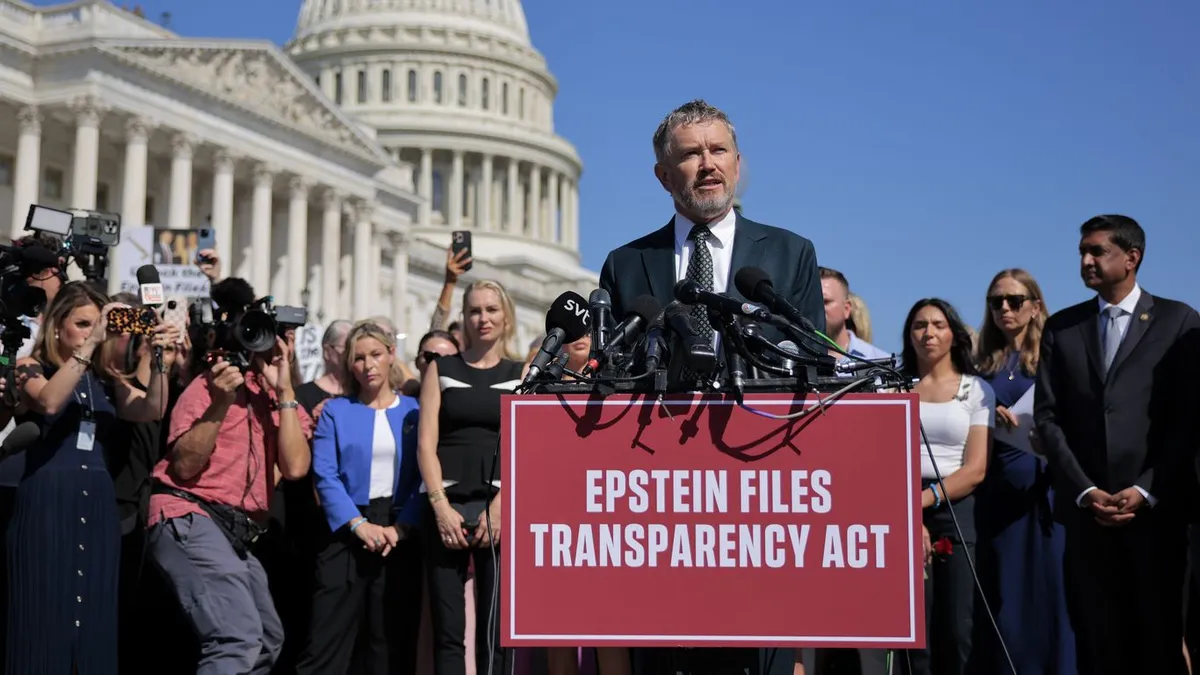
Rep. Thomas Massie (R-Ky.) is making headlines by defying House Speaker Mike Johnson's warnings as he pushes ahead with his discharge petition aimed at compelling the release of Jeffrey Epstein records. This move comes amidst a backdrop of dwindling support from some of his initial Republican allies. The significance of this situation cannot be understated, as it highlights the ongoing tensions within the Republican Party regarding transparency and accountability.
Just days ago, the outlook for Massie's discharge petition seemed nearly assured. However, the momentum has shifted due to the pressure from Republican leadership, the White House, and the recent release of Epstein-related documents by the House Oversight Committee. Speaker Johnson has cautioned Republican members to avoid the petition, asserting that the Oversight Committee's investigation will ultimately provide more comprehensive information. He stated, "It goes further and it has the force of law, because we have subpoena authorities. It makes the discharge irrelevant and unnecessary."
Despite the setbacks, Massie remains resolute in his commitment to gather the necessary 218 signatures to initiate a floor vote for the petition. As of now, the petition boasts 215 signatures. Massie officially filed the petition on Tuesday, coinciding with the Oversight Committee's release of numerous Epstein-related files, which some Republicans interpreted as undermining the necessity of the petition.
Several Republican lawmakers who initially backed Massie’s underlying bill have since withdrawn their support. Rep. Anna Paulina Luna (R-Fla.) expressed her decision not to sign the petition, characterizing the dispute as a personal conflict between Massie and the president. Similarly, Rep. Ralph Norman (R-S.C.) dismissed Massie's efforts, suggesting they were a covert attack on the president. Other Republicans, including Eric Burlison (R-MO) and Tim Burchett (R-Tenn.), have also indicated they will not support the measure, despite being cosponsors of the original bill.
Johnson has forecasted that Massie will struggle to secure the remaining GOP signatures necessary to compel a vote. In response, Massie expressed confidence, stating, "I'll bet anybody here dollars to donuts, we're going to get to 218," though he refrained from speculating on who might sign the petition. Meanwhile, Rep. Victoria Spartz (R-Indiana), who recently attended a press conference with Epstein's victims alongside Massie and Rep. Ro Khanna (D-Calif.), remains undecided about her potential support for the petition.
Adding another layer to the situation, White House officials are actively lobbying Republican lawmakers against signing the petition, reportedly making numerous phone calls to discourage support. Rep. Marjorie Taylor Greene (R-Ga.), one of the few Republicans who have signed the petition, revealed that she faced considerable pushback from the administration regarding her endorsement. She argued, "What’s not true is Comer's investigation is not going to reveal the same sort of things that our discharge petition would reveal. If that were true, the White House wouldn’t be working so hard to stop it."
Even if Massie and Khanna successfully advance their efforts in the House, the proposed bill would still require Senate approval and the president's signature. Former President Donald Trump is widely anticipated to veto the measure if it reaches his desk. Senate Majority Leader John Thune (R-S.D.) further dampened hopes for the legislation, informing reporters that there are no current plans for the Senate to vote on it. Nonetheless, the discharge petition will compel every member to publicly register their stance on the Epstein files, likely stirring discontent among the MAGA base towards Republicans who oppose it.